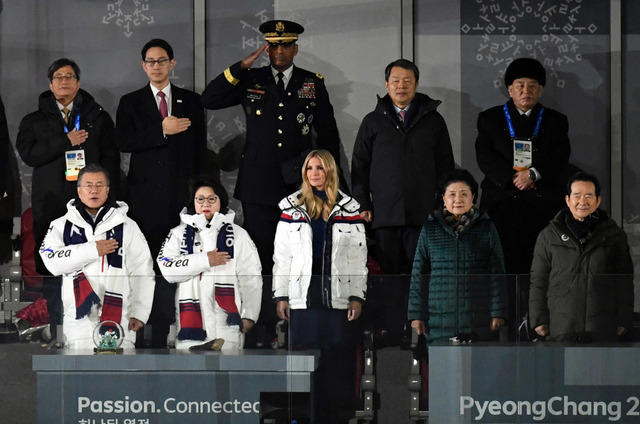Posted on : Mar.1,2018 17:30 KST
Modified on : Mar.1,2018 17:44 KST
 |
|
President Moon Jae-in and his wife Kim Jung-sook stand during the playing of the South Korean national anthem at the Pyeongchang Olympics closing ceremony on Feb. 25. In the front row are President Moon, Kim, Ivanka Trump, Chinese Vice Premier Liu Yandong, and Speaker of the National Assembly Chung Sye-kyun. In the back from (from right) are Kim Yong-chol, Vice Chairman of the Korean Workers’ Party (KWP) Central Committee, Constitutional Court Chief Justice Lee Jin-sung, USFK Commander General Vincent Brooks, a translator, and Supreme Court Chief Justice Kim Myeong-su. (Photo Pool)
|
The Pyeongchang Winter Olympics have brought a striking change to inter-Korean relations. But North Korea-US dialogue, which is essential for resolving the nuclear issue, remains at a standstill. The problem is that neither the US nor North Korea are taking a forward-looking stance. On Feb. 27, the US State Department reiterated its adherence to “maximum pressure” by mentioning denuclearization as an appropriate condition for North Korea-US dialogue.
Amidst all this, the New York Times reported on Feb. 27 that North Korea had sent Syria material that could be used in the manufacture of chemical weapons from 2012 until 2017, based on a report by the UN Security Council Sanctions Committee on North Korea. This was nothing new, since cooperation between North Korea and Syria appeared in last year’s report, too. But it does give more ammunition to hardliners against North Korea in the US government and Congress who are worried about nuclear proliferation.
The announcement of the retirement of Joseph Yun, the State Department’s Special Representative for North Korea Policy and a leading advocate of dialogue in the Trump administration, is prompting concern that the hardliners in the US government are gaining ground. On top of this, it is very likely that the delayed South Korea-US joint military exercises will be held after the Paralympics end on Mar. 18. Marc Knapper, charge d'affaires at the US Embassy in Seoul and acting ambassador, said on Feb. 28 that there was no possibility of a further delay. So while the Pyeongchang Olympics have brightened the prospects of improving inter-Korean relations, uncertainty continues to linger on the Korean Peninsula.
For now, the only way out is for the South Korean government to play an active role as a mediator between North Korea and the US. It is critical to create even the slightest opportunity for contact between Pyongyang and Washington between the end of the Paralympics and the resumption of South Korea-US joint military exercises. Toward this end, the government must do its level best to send a special envoy to the US and another to North Korea in response to the North’s high-ranking delegation.
Ultimately, the focus will probably have to be on the issue of denuclearization. North Korea needs to make some kind of gesture about its willingness to denuclearize, and the US needs to show some strategic flexibility by lowering the requirements for initiating dialogue and making denuclearization not the starting point of dialogue but its end point.
Neither North Korea nor the US are tractable counterparts for South Korea. That means there is no guarantee that the South Korea government’s attempt to mediate dialogue between the two sides will be successful. That said, just two months ago no one would have imagined that inter-Korean relations would have advanced so far and that tensions would have relaxed as they are now. The Moon administration must fulfill the historical mission it has been given for peace on the Korean Peninsula.
Please direct questions or comments to [english@hani.co.kr]









